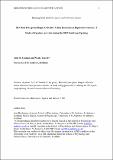Files in this item
How risk perception shapes collective action intentions in repressive contexts : a study of Egyptian activists during the 2013 post-coup uprising
Item metadata
| dc.contributor.author | Ayanian, Arin H. | |
| dc.contributor.author | Tausch, Nicole | |
| dc.date.accessioned | 2018-10-02T23:45:47Z | |
| dc.date.available | 2018-10-02T23:45:47Z | |
| dc.date.issued | 2016-12-01 | |
| dc.identifier | 245629217 | |
| dc.identifier | 705f2335-cded-4c46-85c7-92f041b28476 | |
| dc.identifier | 84994820115 | |
| dc.identifier | 000389340700005 | |
| dc.identifier.citation | Ayanian , A H & Tausch , N 2016 , ' How risk perception shapes collective action intentions in repressive contexts : a study of Egyptian activists during the 2013 post-coup uprising ' , British Journal of Social Psychology , vol. 55 , no. 4 , pp. 700-721 . https://doi.org/10.1111/bjso.12164 | en |
| dc.identifier.issn | 0144-6665 | |
| dc.identifier.other | ORCID: /0000-0002-9471-0673/work/46362118 | |
| dc.identifier.uri | https://hdl.handle.net/10023/16133 | |
| dc.description | This research was conducted while Arin Hovhannes Ayanian was a PhD candidate at the University of St Andrews, on a full scholarship from the School of Psychology and Neuroscience, University of St Andrews, Scotland. | en |
| dc.description.abstract | Social psychological research has overlooked collective action in repressive contexts, where activists face substantial personal risks. This paper examines the social psychological processes motivating activists to engage in collective action in risky contexts. We investigate the idea that perceived risks due to government sanctions can galvanize action through fuelling anger, shaping efficacy beliefs, and increasing identification with the movement. We also argue that anger, efficacy and identification motivate action intentions directly and indirectly through reducing the personal importance activists attach to these risks. We tested our hypotheses within a sample of Egyptian activists (N = 146) from two protest movements who protested against Morsi’s government and the military interventions, respectively, during the 2013 anti-Coup uprising. In line with our hypotheses, the perceived likelihood of risks was positively associated with anger and identity consolidation efficacy, and positively predicted action intentions indirectly through these variables. Risk was also associated with increased political efficacy, but only among anti-military protesters. Anger and political efficacy predicted action intentions directly and indirectly through reduced risk importance. Results also highlighted differential significance of emotional and instrumental motives for the two protest movements. We discuss directions for future research on the motivators of collective action in repressive contexts. | |
| dc.format.extent | 22 | |
| dc.format.extent | 824703 | |
| dc.language.iso | eng | |
| dc.relation.ispartof | British Journal of Social Psychology | en |
| dc.subject | Collective action | en |
| dc.subject | Risk | en |
| dc.subject | Anger | en |
| dc.subject | Efficacy | en |
| dc.subject | Identification | en |
| dc.subject | Egypt | en |
| dc.subject | BF Psychology | en |
| dc.subject | NDAS | en |
| dc.subject | BDC | en |
| dc.subject | R2C | en |
| dc.subject.lcc | BF | en |
| dc.title | How risk perception shapes collective action intentions in repressive contexts : a study of Egyptian activists during the 2013 post-coup uprising | en |
| dc.type | Journal article | en |
| dc.contributor.institution | University of St Andrews. School of Psychology and Neuroscience | en |
| dc.identifier.doi | 10.1111/bjso.12164 | |
| dc.description.status | Peer reviewed | en |
| dc.date.embargoedUntil | 2018-10-03 |
This item appears in the following Collection(s)
Items in the St Andrews Research Repository are protected by copyright, with all rights reserved, unless otherwise indicated.

